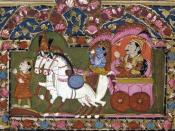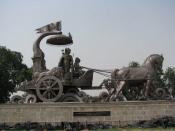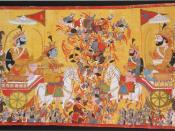In this essay we will look at the criteria Arjuna should base his decision on when considering how to solve his moral dilemma. Once we have established these we will use part of the philosophy indicated in the 'Gita' and examine the flaws in Arjuna's reasons for not wanting to fight in battle in order to resolve what action he must take.
WE must first ascertain exactly what Arjuna's moral dilemma actually was. Arjuna is facing a decision about whether to face his family and friends in battle for the Kingdom. Basically he is torn between his role as a 'warrior' and fear of what the consequences of his role might be in battle; between his duty to fight and his desire to protect those whom he had a duty to protect. More importantly Arjuna is worried what might be the effect on the society he seeks to protect if he is to carry out his duty to fight against the army of Bhima, the 'evil minded son' of Dhrtarastra.
He says, 'Those for whose sake we desire kingdom, these I would not consent to kill'. For him, it is an anathema to kill those whom he regards as his companions, those he has attachments to. 'What pleasure can it be of ours' he goes on to say 'that we slay our kinsmen' and by that he means 'Teachers, fathers, sons and also grandfathers'. It is obvious that Arjuna feels very deeply about the dilemma he is facing and is not just using it as an excuse for the fear of fighting, his limbs 'quail', his mouth 'goes dry' and hair 'stands on end' at the prospect of fighting his own people. The idea of gaining power is superficial when it comes to having to slay the people...


